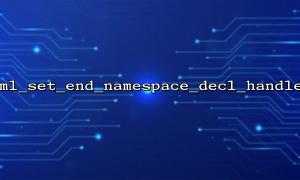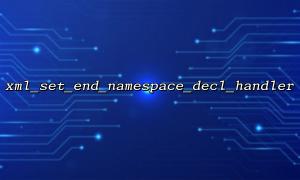When processing XML files in PHP, especially complex XML structures involving namespaces, the parsing efficiency can be improved using event-based parsers such as Expat (extended via PHP's XML Parser). xml_set_end_namespace_decl_handler is a callback function used to handle the end of a namespace declaration. It can better capture and manage content that does not belong to other more specific events, helping developers to more granularly control the parsing process of XML data.
This article will introduce the usage scenarios of these two functions and use code examples to show how they work together in actual development to achieve efficient namespace processing.
xml_set_default_handler(resource $parser, callable $handler) : When no other processor function is called, the default processor will process the current XML data. This is usually used to process text nodes or unspecified content.
xml_set_end_namespace_decl_handler(resource $parser, callable $handler) : Register a processor with the end of the namespace declaration. This callback function is triggered when the namespace scope ends.
When parsing XML files with multiple namespaces, the scope of the namespace changes frequently. We need to monitor these changes to avoid data parsing errors. For example, in SOAP, RSS, or any custom XML protocol, the namespace is defined on the element, entering and exiting layer by layer with the child nodes. If the namespace is not handled properly, incorrect data mapping or logical judgment may occur.
<?php
$xml = <<<XML
<root xmlns:h="http://gitbox.net/ns/hello" xmlns:f="http://gitbox.net/ns/foo">
<h:message>Hello</h:message>
<f:data>World</f:data>
</root>
XML;
$parser = xml_parser_create_ns();
// Process text nodes
function defaultHandler($parser, $data) {
echo "Default handler: {$data}\n";
}
// Namespace end processing
function endNamespaceDeclHandler($parser, $prefix) {
echo "Namespace end: " . ($prefix !== '' ? $prefix : '[default]') . "\n";
}
xml_set_default_handler($parser, 'defaultHandler');
xml_set_end_namespace_decl_handler($parser, 'endNamespaceDeclHandler');
// Set up other necessary processors
xml_set_element_handler($parser,
function ($parser, $name, $attrs) {
echo "Start element: $name\n";
},
function ($parser, $name) {
echo "End element: $name\n";
}
);
// Enable namespace parsing
xml_parser_set_option($parser, XML_OPTION_CASE_FOLDING, 0);
if (!xml_parse($parser, $xml, true)) {
echo "XML Error: " . xml_error_string(xml_get_error_code($parser));
}
xml_parser_free($parser);
?>
Start element: h:message
Default handler: Hello
End element: h:message
Namespace end: h
Start element: f:data
Default handler: World
End element: f:data
Namespace end: f
When entering the <h:message> and <f:data> tags, the corresponding namespace is activated.
defaultHandler captures text nodes between tags.
The endNamespaceDeclHandler is called at the end of the namespace's scope, allowing developers to perform cleaning or logging operations here to ensure consistency of the namespace context.
By combining xml_set_default_handler and xml_set_end_namespace_decl_handler , developers can granularly control the XML parsing process, especially in handling multi-namespace environments. This combination not only improves the analysis efficiency, but also enhances the code's perception of the namespace life cycle, and is suitable for promotion and application in the actual development of complex XML protocol processing.















